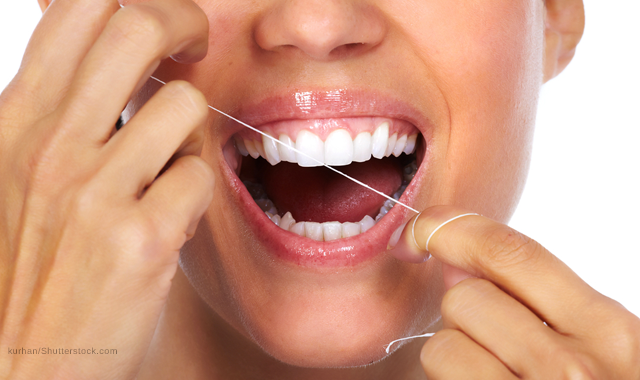Why cleaning between your teeth matters
Whether you prefer string floss or a water flosser, it’s important to find a method that works best for you.

Flossing takes time, it can be hard to do and the news says it doesn’t matter. But as a dental hygienist, I can tell you that cleaning between your teeth does matter in regard to oral health, which correlates to overall body health. Using string floss and how effective it is not only depends on your oral condition, but also highly depends on using the correct technique. For instance, if you use the wrong end of a toothbrush, it’s obviously not going to do the job of removing plaque effectively. The same holds true for string floss. However, if you won’t or can’t use string floss with the proper technique, why not try another method?
There are many different ways you can clean between your teeth beyond traditional string floss. Some of these other methods include interdental brushes, water flossers, and a variety of floss aides and holders that may work for you. And that’s the key here-finding the method that works best for your ability, likelihood of using it and oral condition. This is why your dental hygienist asks if you floss. It’s not to nag or lecture you; it’s to help you find the best method to ensure you are doing it properly.
Why does your oral condition matter when choosing a method of flossing?
A toothbrush only cleans about 2/3 of a tooth’s surface. Would you only clean 2/3 of your body in the shower? This is why additional flossing and interdental (between teeth) cleaning is needed. Your oral condition and shape and depth of your gums matter when it comes to the perfect method for you.
There is a space between your teeth and gums where the gums aren’t attached to the root of your tooth. This space is called a sulcus, or periodontal pocket. A toothbrush only reaches about 1 mm into this space. This space is deeper than 1 mm for most people. For a person with healthy gums, this sulcus or space is 1-3 mm deep. For people with gum disease, it can be much deeper either due to inflammation or tissue destruction caused by disease. String floss, for example, is a good option for people with healthy gums and a sulcus of 1-3 mm because that’s about as far as string floss can clean effectively. However, to effectively clean deeper pockets, a different method or combination of methods might be better.
Trending article: Are electric toothbrushes REALLY better than manual toothbrushes?
The shape of your gums-more specifically your interdental papilla (the gums that come to a point in between your teeth)-dental restorations or appliances, and nooks and crannies due to gum recession, among other things, are also considerations when it comes to picking a method of cleaning between your teeth. One size of pants does not fit everyone. The same holds true when it comes to products that clean between your teeth. Again, a dental hygienist can work with you to find a method that not only suits your oral condition, but one that’s easiest for you and that you will actually use.
Continue to page two to read more...
Why is cleaning between your teeth and below your gums important?
Dental plaque, which is full of bacteria, not only accumulates on your teeth, but it also accumulates below your gums. If this bacteria is not disturbed and removed properly on a daily basis, it can cause infection and disease, including cavities and gum disease. This is because the longer it sits undistributed, the bacteria becomes stronger, and that can lead to the destruction of the tissue and bone that hold your teeth in place, in addition to bleeding and inflammation of your gums. Also, if plaque sits undisturbed, it will harden and cause more irritation to your gums. At this point, the hardened bacteria, also known as calculus or tartar, can only be removed by a dental hygienist. Tartar or calculus can irritate your gums and provides a great home for even more bacteria. This is why cleaning between your teeth and seeing your dental hygienist regularly is crucial to your oral health. This type of bacteria doesn’t only affect your mouth; research has linked bacteria in your mouth to many bodily diseases.
More from the author: What you need to know about gum disease
How does oral health correlate to overall body health?
Simply put, your mouth is connected to the rest of your body. In fact, many diseases first show symptoms in your mouth. This includes some autoimmune diseases and even HIV. Additionally, you are swallowing the bacteria in your mouth all day, every day. If you have gum disease, this bacteria can be harming more than just your mouth. Bacteria can enter your bloodstream and affect other organs in your body.
Research is emerging every day showing links of bacteria from the mouth contributing to heart disease, increased stroke risk, rheumatoid arthritis, low birth weight and preterm babies, several types of cancers (breast, pancreatic, oral/pharyngeal), Alzheimer’s disease and even the ability to control blood sugar levels in diabetes. Disease and infection in your mouth also increases the risk for pneumonia, low testosterone, prostate disease and kidney disease.
Bottom line: An infection in your mouth leads to problems for the rest of your body. Flossing and cleaning between your teeth shouldn’t be an afterthought; the health of your mouth and body depend on it. Be sure to clean your entire mouth and find a method that works best for you.